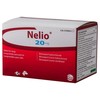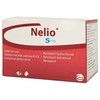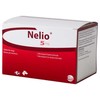Nelio
Nelio Tablets are indicated for the treatment of congestive heart failure in dogs, and for the treatment of chronic renal insufficiency in cats. The tablets have been flavoured to improve acceptance and contain the ingredient Benazepril, which has a beneficial effect on the kidneys and blood circulation.
Nelio Tablets are presented as oblong shaped (Cat) or clover shaped, beige tablets that have been scored for easy and accurate dosing.
Nelio 20mg Tablets for Dogs
£1.30Nelio 20mg Tablets are indicated for the treatment of congestive heart failure in dogs weighing >20-80kg. Nelio Tablets have been flavoured with pig liver for increased palatability and...[More info]
Nelio 5mg Tablets for Cats
£0.62Nelio 5mg Tablets are indicated for the reduction of proteinuria associated with chronic kidney disease in cats. Product Expiry Date : 31st July 2024 Nelio Tablets have been flavoured with...[More info]
Nelio 5mg Tablets for Dogs
£0.62Nelio 5mg Tablets are indicated for the treatment of congestive heart failure in dogs weighing 2.5-20kg. Nelio Tablets have been flavoured with pig liver for increased palatability and...[More info]
Contraindications
Cats and Dogs
Do not use in case of hypersensitivity to the active substance or to any of the excipients.
Do not use in cases of hypotension, hypovolaemia, hyponatraemia or acute renal failure.
Do not use in cases of cardiac output failure due to aortic or pulmonary stenosis.
Do not use during pregnancy or lactation.
Special precautions for use in animals
Cats and Dogs
No evidence of renal toxicity of the veterinary medicinal product has been observed during clinical trials, however, as is routine in cases of chronic kidney disease, it is recommended to monitor plasma creatinine, urea and erythrocyte counts during therapy.
The Efficacy and safety of benazepril have not been established in cats and dogs of weight less than 2.5 kg
Special precautions to be taken by the person administering the product to animals
Wash hands after use.
In case of accidental oral ingestion, seek medical advice immediately and show the label to the physician.
Pregnant women should take special care to avoid accidental oral exposure, because angiotensin converting enzyme (ACE) inhibitors have been found to affect the unborn child during pregnancy in humans.
Adverse reactions
Cats
In cats with chronic kidney disease, the product may increase plasma creatinine concentrations at the start of therapy. A moderate increase in plasma creatinine concentrations following administration of ACE inhibitors is compatible with the reduction in glomerular hypertension induced by these agents, and therefore is not necessarily a reason to stop therapy in the absence of other signs.
The product may increase food consumption and body weight.
Emesis, anorexia, dehydration, lethargy and diarrhoea have been reported in rare occasions.
Dogs
In double-blind clinical trials in dogs with congestive heart failure, the product was well tolerated with an incidence of adverse reactions lower than observed in placebo-treated dogs.
A small number of dogs may exhibit transient vomiting, incoordination or signs of fatigue.
In dogs with chronic kidney disease, the product may increase plasma creatinine concentrations at the start of therapy. A moderate increase in plasma creatinine concentrations following administration of ACE inhibitors is compatible with the reduction in glomerular hypertension induced by these agents, and is therefore not necessarily a reason to stop therapy in the absence of other signs.
Use during pregnancy or lactation
Cats
Do not use during pregnancy or lactation. The safety of the product has not been established in breeding, pregnant or lactating cats. Benazepril reduced ovary / oviduct weights in cats when administered daily at 10 mg / kg for 52 weeks. Embryotoxic effects (foetal urinary tract malformation) were seen in trials with laboratory animals (rats) at maternally nontoxic doses.
Dogs
Do not use during pregnancy or lactation. The safety of the product has not been established in breeding, pregnant or lactating dogs. In cats benazepril reduced the weight of the ovaries and the ovarian ducts when given at a daily dose of 10 mg/kg for 52 weeks. Embryotoxic effects (foetal urinary tract malformation) were seen in trials with laboratory animals (rats) at maternally nontoxic doses.
Interactions
Cats
In humans, the combination of ACE inhibitors and Non-Steroidal Anti-Inflammatory Drugs (NSAIDs) can lead to reduced anti-hypertensive efficacy or impaired renal function. The combination of the product and other anti-hypertensive agents (e.g. calcium channel blockers, β-blockers or diuretics), anaesthetics or sedatives may lead to additive hypotensive effects. Therefore, concurrent use of NSAIDs or other medications with a hypotensive effect should be considered with care. Renal function and signs of hypotension (lethargy, weakness etc) should be monitored closely and treated as necessary. Interactions with potassium preserving diuretics like spironolactone, triamterene or amiloride cannot be ruled out. It is recommended to monitor plasma potassium levels when using the product in combination with a potassium sparing diuretic because of the risk of hyperkalaemia.
Dogs
In dogs with congestive heart failure, this product has been given in combination with digoxin, diuretics, Pimobendan and anti-arrhythmic veterinary medicinal products without demonstrable adverse interactions.
In humans, the association of ACE inhibitors and Non-Steroidal Anti-Inflammatory Drugs (NSAIDs) can lead to reduced anti-hypertensive efficacy or impaired renal function. The combination of this product and other anti-hypertensive agents (e.g. calcium channel blockers, β-blockers or diuretics), anaesthetics or sedatives may lead to additive hypotensive effects. Therefore, concurrent use of NSAIDs or other medications with a hypotensive effect should be considered with care. Renal function and signs of hypotension (lethargy, weakness etc) should be monitored closely and treated as necessary.
Interactions with potassium preserving diuretics like spironolactone, triamterene or amiloride cannot be ruled out. It is recommended to monitor plasma potassium levels when using this product in combination with a potassium sparing diuretic because of the risk of hyperkalaemia.
Amounts to be administered and administration route
The product should be given orally once daily, with or without food. The duration of treatment is unlimited.
Cats
The product tablets are flavoured and are taken voluntarily by most cats. The product should be administered orally at a minimum dose of 0.5 mg (range 0.5-1.0) benazepril hydrochloride/kg body weight once daily.
In case of use of half tablets: Put the remaining half of the tablet back into the blister pocket and use for the next administration.
Dogs
The product should be administered orally at a minimum dose of 0.25 mg (range 0.25-0.5) benazepril hydrochloride/kg body weight once daily.
The dose may be doubled, still administered once daily, to a minimum dose of 0.5 mg/kg (range 0.5-1.0), if judged clinically necessary and advised by the veterinary surgeon.
In case of use of quarters or half tablets: Put the remaining quantity of the tablet back into the blister pocket and use for the next administration.
The tablets are flavoured and may be taken spontaneously by dogs, but can also be administered directly into the dog's mouth or be given with food if necessary.
Overdose
Transient reversible hypotension may occur in cases of accidental overdose. Therapy should consist of intravenous infusion with warm isotonic saline.
Cats
The product reduced erythrocyte counts in normal cats when dosed at 10 mg/kg body weight once daily for 12 months but this effect was not observed at the recommended dose during clinical trials in cats.
Dogs
The product reduced erythrocyte counts in normal dogs when dosed at 150 mg/kg body weight once daily for 12 months, but this effect was not observed at the recommended dose during clinical trials in dogs.
Excipients
Pig liver flavour, Yeast, Lactose monohydrate, Croscarmellose sodium, Anhydrous colloidal silica, Hydrogenated castor oil, Microcrystalline cellulose.



